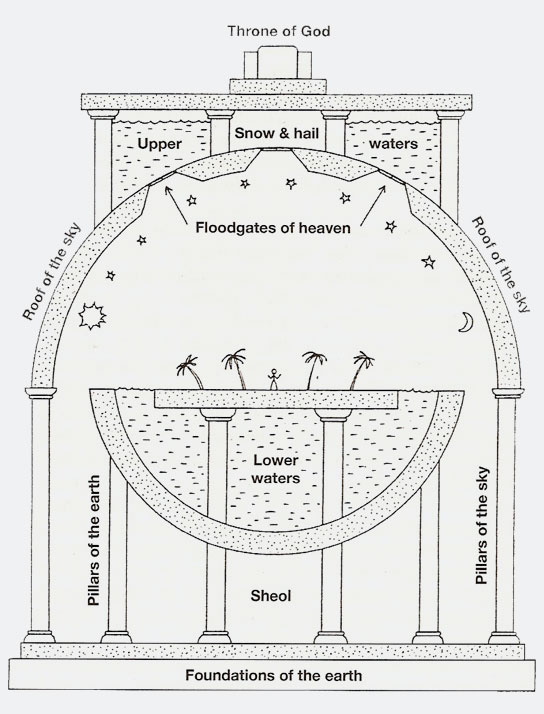
The ‘Mythistory’ of Genesis 1-11: Creation (part 1 of 2)

The ‘Mythistory’ of Genesis 1-11: Introduction
18th July 2020
End Times, Conspiracies and The Church Who Cried ‘Wolf’
22nd August 2020Science vs. The Bible
The creation story presented in the opening chapter of Genesis is undoubtedly a ‘hot topic’ within the renowned Science vs. Faith debate, one that for many years has been weaponised and used in such a way as to try to debunk the author’s account and indeed the Bible as a whole. In spite of these assaults, however, many Christians remain steadfast and unyielding to scientific claims that appear contrary to what in their opinion, Genesis clearly teaches – that is to say: God made the world, creation and mankind in 6 literal days. Period.
For most people (though admittedly, not all) who hold to these fundamental beliefs, the battle cry is loud and clear - the Bible trumps science, and the closed-handed grip of a literal 6-day creation is most certainly both a black and white issue and a strictly non-negotiable one at that. Indeed, some may very well argue that to give way to science and its understanding of a much older universe and earth (not to mention its view on the absurdity of a global flood), is to compromise on the integrity of the Bible itself. In short, for those who are caught up in this debate, the stakes are high and the concerns may be put forth as follows: if the Bible is wrong from the get-go in its depiction of a literal 6-day retelling of the cosmos, earth and its inhabitants, then we have a major problem... one that brings the accuracy and truthfulness of Scripture and even the Gospel itself into disrepute.

Defusing the tension
Rather than engage the debate between Science and The Bible (which I did for many years!), it is instead my goal to try and defuse the tension, proposing that if we take time to read and listen to what the text is saying within the world it is being said, then many of these on-going intellectual boxing matches can be (and could have been) easily prevented.
I am of the opinion that Science vs. The Bible is a non-issue, and pitting one against the other is an unnecessary fight. To date, it has spilled much ink, killed a lot of innocent trees and - like a botched Botox job - has led many apologists to inject some 'interesting' assumptions into the Biblical text, creating some rather strange looking interpretations and theories. Furthermore, I have observed some not so gracious debates concerning this particular subject, which unfortunately have not been so dissimilar to watching Prince Andrew’s recent interview in defence of his 'friendship' with Jeffrey Epstein1 – on both occasions I felt extremely uncomfortable, with my hands over my eyes and head slowly shaking in disbelief of what I was actually hearing! Let's move on, shall we?
Our gateway into the Ancient World...
At the risk of repeating myself from my earlier post (however, for the sake of driving home the point one more time), I believe that if we truly wish to understand Genesis' opening chapter then it is imperative that we as readers surrender our scientific/modern-historical lens, and as much as is possible, try to enter into the culture of its time and put on the sandals of its people.
Our gateway into this ancient world was unintentionally opened to us in the mid-1800's, when archaeologists working in Assyria stumbled upon thousands of clay tablets. These tablets eventually came to be known as the Akkadian texts, and their content had not been touched or read for over 2,000 years. What was on these tablets? Ancient stories (myths) from Ancient Israel’s neighbours - the Assyrians, Babylonians, Canaanites, Egyptians, amongst others - consisting of creation stories, flood stories (very similar to the Noah story in the Bible...we will get to that eventually!) and valuable insights into their understanding about the cosmos and its function. The discovery of these tablets and the insight which they have offered to us, cannot be overstated, and as Pete Enns2 writes, it is because of them "the way people viewed the Bible would never be the same again". I can't help but agree.

"The REAL fight was an ancient one, and we missed it many moons ago - for it was fought in an ancient arena between Israel and its neighbours"
FIGHT, FIGHT, FIGHT!
If I may borrow and even stretch my earlier proverbial boxing analogy once more, I submit to you that sitting down to watch Science vs. The Bible 'battle it out', is to tune in to the wrong pay-per-view fight. The REAL fight was an ancient one, and we missed it many moons ago - for it was fought in an ancient arena between Israel and its neighbours. The instigation for this fight? Israel's toe-to-toe challenge against the theological claims, status quo and worldview of its day. It is only when we understand this, that I feel we are in a much better position to crack open a few beers (or other preferred beverage), watch the opening chapter highlights and appreciate some of the heavy hits that are being thrown! As with every fight, however, it is customary to introduce the two contenders: First up, we have Ancient Israel's neighbours weighing in with the theological and worldview beliefs of their day...

ANE COSMOLOGY AND THEOLOGY 101
Modern cosmology and Ancient Near Eastern (ANE) cosmology are, excuse the pun, worlds apart. For us, the enlightenment has undoubtedly shaped and informed much of how we as modern ‘enlightened’ people understand many aspects of our lives, not least of which is the universe - comprising of our own spherical blue planet, floating in space with many other planets, stars and galaxies.
Of course ancient people were not privy to such insights and their cosmology is a reflection of their understanding at that time - the image above attests to this and attempts to show just how they conceived of the world around them. They considered the earth to be a flat disc (‘Amen’ from the Flat-earthers)3 that was supported by pillars deep within the ocean (Psalm 75:3). For ancient people the ocean was personified as a fearful force of chaos, one that could not be tamed and was home to the ancient sea monsters such as Rahab and Leviathan4 - the ancient and prehistoric bogeymen if you will. The sky was regarded as a solid dome, which not only held the sun, moon, and stars (believed to be deities) in place, but also kept the chaotic sea above it at bay. Observing from above the dome were the various gods, who the ancients believed were controlling everything down on the ground.
What they believed about the gods
Polytheism was 'a given' in ANE theology, with the belief that there were many gods whose powers functioned within various domains (i.e. the sun god, the sea god etc.) These gods were to be feared - and for good reason as they were extremely dangerous and erratic in their actions, therefore, obedience and respect towards them was paramount for fear of being smitten by one of the almighty smiters.
What they believed about creation
Another shared belief recognised within accounts from various ANE stories, is the depiction of how the world was created, and in many instances it was established from the remains of other defeated gods following a cosmic battle. Case in point is the infamous (and rather gruesome!) Babylonian creation story entitled ‘Enuma Elish’. In this account, the Babylonian god ‘Marduk’ fights the sea serpent goddess ‘Tiamat’ and wins. Ever gracious in victory, he cuts her body in half, forming the heavens with one half and the earth with the other.
What they believed about themselves
The worth ascribed to humankind had very little value and many stories portray humans in such a way that would have devastating effects on anyone’s self-esteem and self-image. In the Enuma Elish, having defeated Tiamat, Marduk continues his winning streak and takes another god Kingu, cuts his arteries, killing him and then proceeds to create humans from his blood…these certainly weren’t the kind of stories you would be telling in ANE Sunday School! Other myths told stories of humans being created from excrements of conquered gods. Equally as depressing was the vocation given to humans, and in many instances their purpose was simply to be slaves to the gods and to do their work for them as they were too lazy.
A primer to Genesis
I appreciate that this overview has been brief (this is only a blog after all!), however its purpose has been to provide a general context for the mind-set of ancient people and offer an understanding as to how they made sense of the world around them. We might summarise their worldview in three overarching points – (1) the gods were many and they were to be feared, (2) creation was messy and in some ways disorderly, and (3) your self worth was nothing more than a piece of divine dung. Make a worship song out of that! Selah.
It is important to note, however, that in as much as this understanding is giving us a glimpse into the ancient world, it is also giving us a context to Genesis’ world as we come to read the opening chapter - in many ways acting as a primer or preface. By that I mean, whilst this was indeed the worldview of Ancient Israel's neighbours, so too was it Ancient Israel's understanding, for it was the world in which they grew up as well. They weren’t immune from the cosmological and philological beliefs of their day; they couldn’t escape it, and, like everyone else, shared in it - it was part of the DNA of their culture and the air they breathed. The pillars that propped up the earth and the dome which covered the sky were still present, and the forces of chaos that lurked in the depths of the sea were still something to be feared. Moreover, God did not simply seek to correct or completely destroy these conceptions and promote them to a 21st Century modern understanding of how the world really is, as if to show them a screenshot of earth and the universe from the Hubble Space Telescope - this is not what Genesis in particular, or the Bible in general, is trying to do.5 Rather, God meets them at their level, speaking within the boundaries of their worldview conception, and as we will later see, allowed radical truths about Himself, creation and mankind to cut through, subverting the key (mis)conceptions within this ancient time and place.
In the next post we will introduce our second contender, Ancient Israel...
- Epstein DIDN'T kill himself
- Pete Enns, Inspiration and Incarnation
- Whilst I enjoy a good conspiracy theory (Titanic didn't sink, the moon landing was faked, Epstein didn't kill himself - HE DIDN'T!!) I do however draw the line at the idea of the earth being flat. If you adopt this theory I simply ask that you please stop.
- During my militant 'Young-Earther/Creationism days', I was always led to believe that Rahab, Leviathan and Behemoth were the Bible's description of Dinosaurs. Such arguments were made in an effort to squeeze them in to the short time span of only 6,000 - 10,000 years, which many creationists believe the Bible allows for. However, having gained an appreciation for ANE texts and the immense value that they offer with respect to Biblical interpretation, I feel that this is both an unsubstantiated and unnecessary claim to make. I think that their function is best served as mythological symbols of chaos which God subdues, conquers and controls - this point will be further elaborated upon in the next post!
- The popular view of reading science into the Bible in an effort to 'marry the two together', is known as concordism. I believe, however, that such efforts (which I hope by now are quite clear!) are counterintuitive as they disregard both the author's original intent and the fact that they would have been totally ignorant and oblivious towards what we as modern readers have come to know as 'science'. For more insight and a rebuttal against concordism, I encourage you to read The Lost World of Genesis One by John Walton.





2 Comments
If after reading this post you feel that the theological implications do not warrant a comment, then at the very least please feel free to leave a comment on a conspiracy theory which is of particular interest to you and close to your heart…thank you.
Excellent read thanks Nick